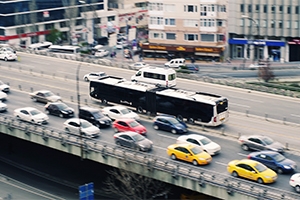Business
Memorial Day Travel and Earnings are on the Rise - Or Are They? Kogod Professor Says It's Hard to Quantify Projected Gains and Losses of Holiday Weekend

Last weekend, people across the country hit the road for long Memorial Day weekend getaways. The American Automobile Association (AAA) estimated that more than 41.5 million people in America would travel for the holiday weekend - nearly 5 percent more than last year, and the most in more than a dozen years.
What does this mean, economically speaking? And, if it is a positive business trend, is it possible for businesses to quantify it?
The answer to these questions isn't necessarily a straightforward one. According to Catalin Stefanescu, a lecturer in finance and real estate at Kogod, "It is very hard to quantify a net effect."
"I would not be very enthusiastic about economic gains because most of the time, they come at a steep cost," he said, citing as an example the fact that many cities hosting the Olympic games lose significant amounts of money. "Most studies that estimate gains/losses have serious shortcomings."
Despite such shortcomings, data does point to increased travel, however - and potentially increased business earnings. AAA also projected that airfare and car rental prices would be lower this year, as well, which could incentivize travelers. Airfare is estimated at an average of about $168 on the top 40 domestic routes - 7 percent lower than last year. And the average daily cost of renting a car, $59, was the lowest Memorial Day rate in four years.
It's notable that gas prices are high, however. The AAA Daily Fuel Gauge states that, as of May 21, the average national gas price was $2.93, the highest going into Memorial Day weekend since 2014, when gas prices stood at $3.65.
AAA did not anticipate this would deter travelers, however. "It won't keep travelers home this Memorial Day weekend," said Bill Sutherland, senior vice president, AAA Travel and Publishing.
Of course, the price of transportation isn't the only factor under consideration, especially in cities with a high holiday market. Stefanescu points out, however, that quantitative data is both hard to find and unclear, when it comes to matters like hotels and restaurants.
"While it is true that one expects an increase in the demand for hotels rooms during Memorial Day, it is not clear that there will be a net increase in the demand for restaurant reservations, as many residents are travelling outside the area during this period," Stefanescu says.
Furthermore, tourism monies do not necessarily mean a significant gain to local economies when residents vacate to other areas for the holiday weekend.
Particularly in the DC area, a federal holiday can cause a significant decrease in output. Stefanescu notes that there has been neither a pattern to show a rise in employment to meet tourism demand, nor a surge in area hotel prices relative to other months. In the DC region, there is no evidence that, per total, Memorial Day weekend brings in any more economic gain than any other holiday weekend, or indeed any other summer weekend.
"When you analyze the potential impact on local economies," Stefanescu says, "you must not forget that not only do these holidays bring an influx of tourists, but they 'drive out' many of the permanent residents. Estimating net gains/losses are extremely hard to quantify."
Read more about Kogod Professor Catalin Stefanescu.
